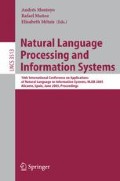Abstract
For most English words, dictionaries give various senses: e.g., “bank”can stand for a financial institution, shore, set, etc. Automatic selection of the sense intended in a given text has crucial importance in many applications of text processing, such as information retrieval or machine translation: e.g., “(my account in the) bank” is to be translated into Spanish as “(mi cuenta en el) banco” whereas “(on the) bank (of the lake)” as “(en la) orilla (del lago).” To choose the optimal combination of the intended senses of all words, Lesk suggested to consider the global coherence of the text, i.e., which we mean the average relatedness between the chosen senses for all words in the text. Due to high dimensionality of the search space, heuristics are to be used to find a near-optimal configuration. In this paper, we discuss several such heuristics that differ in terms of complexity and quality of the results. In particular, we introduce a dimensionality reduction algorithm that reduces the complexity of computationally expensive approaches such as genetic algorithms.
This research was supported by the MIC (Ministry of Information and Communication), Korea, under the Chung-Ang University HNRC-ITRC (Home Network Research Center) support program supervised by the IITA (Institute of Information Technology Assessment).
Access this chapter
Tax calculation will be finalised at checkout
Purchases are for personal use only
Preview
Unable to display preview. Download preview PDF.
References
Cowie, J., Guthrie, J.A., Guthrie, L.: Lexical disambiguation using simulated annealing. In: Proc. of the International Conference on Computational Linguistics, pp. 359–365 (1992)
Edmonds, P., Kilgarriff, A. (eds.): Journal of Natural Language Engineering, 9(1) (2003), Special issue based on Senseval-2, www.senseval.org
Gale, W., Church, K., Yarowsky, D.: One sense per discourse. In: Proc. of the DARPA Speech and Natural Language workshop, Harriman, NY (February 1992)
Gelbukh, A., Sidorov, G., Han, S.-Y.: Evolutionary Approach to Natural Language Word Sense Disambiguation through Global Coherence Optimization. WSEAS Transactions on Communications 1(2), 11–19 (2003)
Lesk, M.: Automatic sense disambiguation using machine-readable dictionaries: how to tell a pine cone from an ice cream cone. In: Proc. of ACM SIGDOC Conference, Toronto, Canada, pp. 24–26 (1986)
Author information
Authors and Affiliations
Editor information
Editors and Affiliations
Rights and permissions
Copyright information
© 2005 Springer-Verlag Berlin Heidelberg
About this paper
Cite this paper
Gelbukh, A., Sidorov, G., Han, SY. (2005). On Some Optimization Heuristics for Lesk-Like WSD Algorithms. In: Montoyo, A., Muńoz, R., Métais, E. (eds) Natural Language Processing and Information Systems. NLDB 2005. Lecture Notes in Computer Science, vol 3513. Springer, Berlin, Heidelberg. https://doi.org/10.1007/11428817_47
Download citation
DOI: https://doi.org/10.1007/11428817_47
Publisher Name: Springer, Berlin, Heidelberg
Print ISBN: 978-3-540-26031-8
Online ISBN: 978-3-540-32110-1
eBook Packages: Computer ScienceComputer Science (R0)

